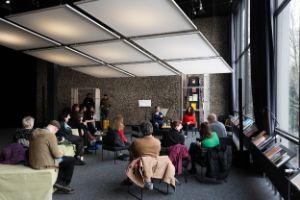Space for Knowledge Exchange & Installation
Library of MaerzMusik

Library of MaerzMusik 2023 © Berliner Festspiele, photo: Camille Blake
16.3. – 19.3./22.3., from 14:00
21./23.3. – 24.3., from 12:00
20.3. closed
Free admission
The MaerzMusik Library opens during the festival as a site of embodied knowledge and encounters. In addition to an installation by Christina Kubisch and scores by Lucia Dlugoszewski, the programme includes artists’ talks with François Bonnet, Sarah Nemtsov, George Lewis and many others.
Knowledge comes from experience, and in turn it can create new experiences. The MaerzMusik Library facilitates interaction among and with artists, audiences and the media. The modular archive at the Haus der Berliner Festspiele will pull together different threads from the festival programme. In the second part of the comprehensive research project “Contemplations into the Radical Others” on the life and work of Lucia Dlugoszewski, visitors can look at the composer’s scores and sketches and listen to her music. Christina Kubisch’s installation “KUPFERGARTEN” (“Copper Garden”) fills the room, inviting visitors to actively experience rather than passively consume: Her use of discursive sound deals with the aesthetics and political dimensions of an everyday material. The agenda also includes talks with composers and artists. On 22nd March, the MaerzMusik Library will make a guest appearance at the Akademie der Künste to promote exchange across institutions, including conversations and a presentation of the new book “Composing While Black. Afrodiasporic New Music Today” with its co-editors George Lewis and Harald Kisiedu and others.
Saturday 16.3.
14:00 | Conversation: INA grm’s Acousmonium
with KMRU, Jessica Ekomane, Eve Aboulkheir and François Bonnet
Moderated by Jessica Ekomane
Welcome note: Kamila Metwaly
Related event: Acousmonium
16:00 | Conversation and Guided Tour: KUPFERGARTEN
with Christina Kubisch and Antonia Alampi
The tour and coversation is in English.
Related Sound Installation: Topographies of Hearing: KUPFERGARTEN
Monday 18.3.
16:00 | Conversation and Listening Session
with Sarah Nemtsov and Ernst Surberg
Related events: b-l duo (bertram wee / lynette yeo) & Pulp Science
Thursday 21.3.
12:00 – 16:00 | Contemplations into the Radical Others: Laboratory Part 1
The series is part of the festival’s focus on Lucia Dlugoszewski.
12:00 | Performance: Lucia Dlugoszewski’s “Clarinet Music for the Left Ear in a Small Room”
for clarinet
by Carl Rosman (Ensemble Musikfabrik)
Listening Session: Re-Inventing the Inventions
with Dirk Rothbrust, followed by a conversation with Thomas Meixner
13:30 | Conversation: Ensemble Perspective on Performing Dlugoszewski’s Music
with Christine Chapman, Lilianna Krych, Agnese Toniutti, Liwia Bargieł and Monika Żyła
18:00 | Conversation: Listening to Helmut Lachenmann
With Helmut Lachenmann and Björn Gottstein
Unfortunately, the talk with Helmut Lachenmann on Thursday, 21 March, cannot take place.
Related events: teeth
Friday 22.3.
14:00 – 18:00 | Library goes AdK
Akademie der Künste, Hanseatenweg
14:30 | Reading and Conversation: Composing While Black. Afrodiasporic New Music Today
with Dr. Harald Kisiedu, George Lewis and voice recorded reading by Elaine Mitchener
Saturday 23.3.
12:00 – 16:00 | Contemplations into the Radical Others: Laboratory Part 2
The series is part of the festival’s focus on Lucia Dlugoszewski.
12:00 | Performance: Lucia Dlugoszewski’s “Clarinet Music for the Left Ear in a Small Room”
for clarinet
by Carl Rosman (Ensemble Musikfabrik)
Conversation: Taking Time to be Vulnerable
with Marco Blaauw, Mazyar Kashian, Elena Rykova, Bethan Morgan-Williams
13:00 | Conversation: Performing the Archive: Focus on Dance
with Katherine Duke, Edivaldo Ernesto and Louis Kavouras
14:00 | Performative Lecture: Problem as Possibility: Dialoguing with Dlugoszewski’s Scores
with Kate Doyle and Agnese Toniutti
16:00 | Panel: Improvisation as Praxis: Music as a Form-of-Life
with Professor John Sutton (Macquarie University/University of Stirling), Professor Michael Wheeler (University of Stirling), Ass. Prof. Nanette Nielsen (University of Oslo), Dr. Christopher A. Williams and Dr. Joshua Bergamin from the project “(Musical) Improvisation & Ethics”
Related Event: (Musical) Ethics Lab 6
Sunday 24.3.
12:00 – 16:15 | Contemplations into the Radical Others: Laboratory Part 3
The series is part of the festival’s focus on Lucia Dlugoszewski.
12:00 | Conversation: Processes and Procedures
with Christine Chapman, Marco Blaauw, Monika Żyła and Kamila Metwaly
Performance: Song for the Poetry of Everyday Sound
with Katherine Duke, Kate Doyle and others
13:00 | Lecture: Chasing the Morning Star: The Aesthetic and Philosophical Armatures of Lucia Dlugoszewski
with Louis Kavouras
14:00 | Lecture: The Musical Cartography of Lucia Dlugoszewski
with Dustin Hurt
15:00 | Conversation: Transformations of Cantilever
with Dustin Hurt
16:00 | Performance: Lucia Dlugoszewski’s “Violin Music for the Left Ear in a Small Room”
with Hannah Weirich
The project “Library” was initiated by MaerzMusik, designed by Diogo Passarinho Studio and is funded by Hauptstadtkulturfonds.
 |